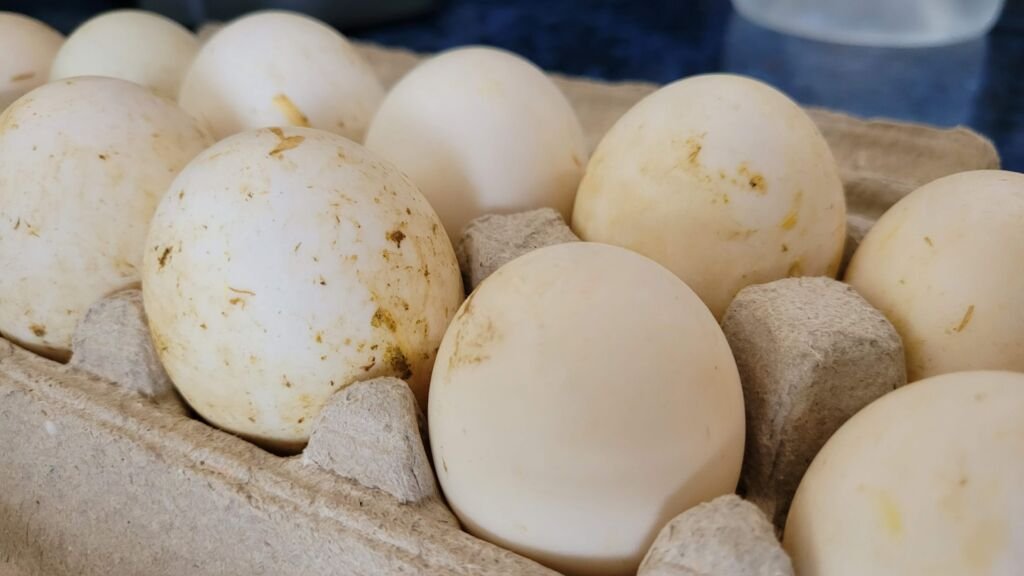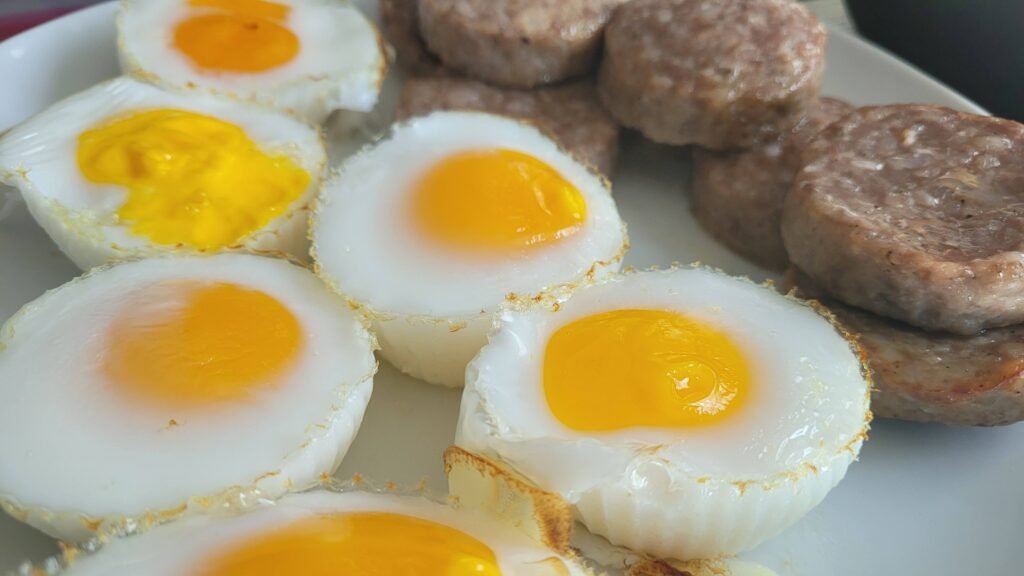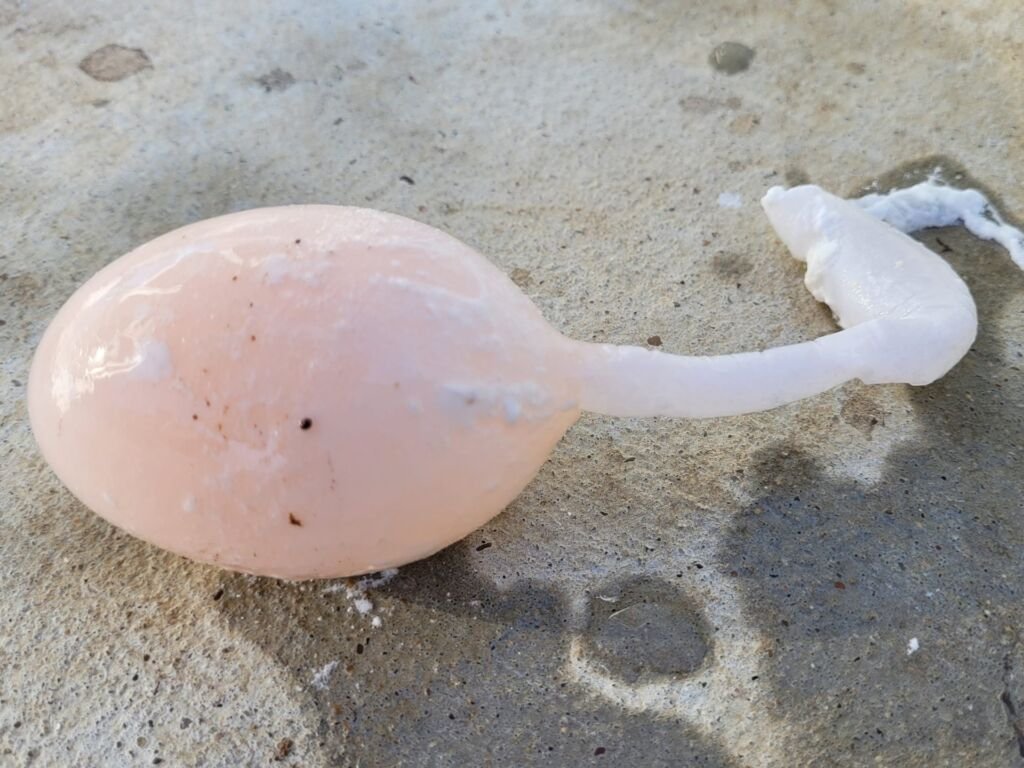Last updated on July 14th, 2024 at 02:16 pm
Duck eggs are taking the culinary world by storm! Their rich flavor and creamy texture are a delightful upgrade to classic chicken eggs. But when the love for deviled eggs (or perfectly peeled snacks!) extends beyond immediate consumption, a crucial question arises: how long do hard-boiled duck eggs last in the fridge? Fear not, curious cooks! This ultimate FAQ cracks the code on hard-boiled duck egg storage, shelf life, and more. We’ll answer all your burning questions, ensuring your delightful duck egg creations stay fresh, delicious, and ready to impress. So, whether you’re a seasoned foodie or a newfound fan of duck eggs, dive into this guide and unlock the secrets to perfectly storing your hard-boiled treasures!

Disclaimer: I may earn a commission if you buy products or services through my affiliate links. This will not affect the price you pay. I only recommend products or services that I believe will be beneficial to my readers.
The Big Question: How Long Do Hard-Boiled Duck Eggs Last in the Fridge?
Shelf Life Breakdown: Unveiling the Numbers
The good news is that hard-boiled duck eggs boast a longer fridge life than their chicken counterparts! Here’s the breakdown:
- Ideally Stored: Properly stored hard-boiled duck eggs can last a delightful 7 to 10 days in the refrigerator.
- Playing it Safe: If you’re unsure about the exact boiling time or storage conditions, err on the side of caution and enjoy them within 5 to 7 days.
Factors Affecting Shelf Life: Freshness Matters!
Several factors can influence how long your hard-boiled duck eggs stay fresh:
- Freshness of the Eggs: Start with the freshest duck eggs possible. Look for clean, uncracked shells with no signs of spoilage.
- Cooking Time: A perfect hard boil minimizes the risk of bacterial growth. Aim for a consistent boil time, depending on your desired yolk firmness.
- Cooling Method: Rapid cooling after boiling is crucial. Submerge the eggs in an ice bath immediately after cooking to stop the cooking process and prevent bacterial growth.
- Storage Container: Choose an airtight container to prevent air and odor exchange and protect your eggs from fridge contaminants.
Perfecting Your Hard-Boiled Duck Eggs: Cooking Time & Tips
The cooking time for hard-boiled duck eggs depends on your desired yolk consistency. Here’s a breakdown:
- For a completely solid yolk: Aim for 11 minutes of boiling time.
- For a medium-hard yolk with a slightly soft center: Boil for 8 minutes.
- For a soft-boiled yolk that’s still runny: Cook for 7 minutes or less.
Here are some additional tips for perfect hard-boiled duck eggs:
- Use room-temperature eggs for even cooking.
- Gently lower the eggs into boiling water to avoid cracking.
- Immediately transfer the eggs to an ice bath after boiling to stop cooking.
- Duck eggs have thicker shells than chicken eggs, so they account for slightly longer cooking times.
By following these tips, you can maximize the shelf life of your hard-boiled duck eggs and enjoy their deliciousness for days to come!
Why Do Cooked Eggs Have a Purple Ring?
When you hard-boil an egg, the heat causes the proteins in the egg white and yolk to denature and coagulate. During this process, sulfur in the egg white reacts with iron in the egg yolk, forming ferrous sulfide. This compound is what creates the purple or sometimes greenish ring around the yolk.
How to Prevent the Purple Ring
- Proper Cooking Time: Avoid overcooking your eggs. Hard-boil them for about 9-12 minutes, depending on their size.
- Rapid Cooling: After boiling, immediately transfer the eggs to a bowl of ice water or run them under cold water for a few minutes. This stops the cooking process and helps prevent the ring.
- Gentle Heating: Start with eggs in cold water and bring them to a gentle boil, then reduce the heat to a simmer. This more gradual heating process can also help minimize the formation of the ring.
By following these tips, you can enjoy perfectly cooked hard-boiled eggs without the unappetizing purple ring!
Is it safe to eat hard-boiled eggs with a purple or greenish ring around the yolk?
You can eat hard-boiled eggs with a purple or greenish ring around the yolk. The discoloration is harmless and does not affect the taste or nutritional value of the egg. It’s simply a result of the chemical reaction between sulfur and iron when the egg is overcooked. While it may not look as appetizing, the egg is still safe and perfectly fine to eat.
Essential Storage Tips: Keeping Your Hard-Boiled Duck Eggs Fridge-Fresh
Conquering the art of hard-boiled duck egg storage is all about creating a cool, safe environment that minimizes bacterial growth and keeps your eggs fresh for as long as possible. Here are some key tips to ensure your duck egg creations stay fridge-fresh:
The Perfect Container: Keeping Air and Odors Out
- Ditch the Egg Carton: The original egg carton isn’t airtight and can allow odors to permeate. Instead, choose an airtight container specifically designed for food storage.
- Glass or Plastic Power: Both glass and BPA-free plastic containers work well. Opt for a size that comfortably holds your hard-boiled eggs without overcrowding.
- Single Layer is Key: Arrange your hard-boiled duck eggs in a single layer to ensure proper air circulation and prevent any from getting squished.
Location, Location, Location: Choosing the Ideal Fridge Spot
- Cool and Consistent: The fridge door is the warmest zone, so avoid storing your eggs there. Choose a shelf towards the back where the temperature is most consistent and coldest.
- Away from the Powerhouse: To prevent odor transfer, keep your hard-boiled duck eggs away from strong-smelling foods or raw meat.
- Vegetable Crisper (Optional): While not always recommended, some sources suggest storing peeled hard-boiled duck eggs in the crisper drawer for extra moisture retention. However, the higher humidity can slightly shorten their shelf life.
Labeling is Key: Marking the Date for Optimal Freshness
- Label It Up: Write the boiling date on your storage container with a permanent marker. This simple step helps you track how long the items have been in the fridge and ensures you consume them within the recommended timeframe.
- First In, First Out: Implement a “first-in, first-out” system. Place the newly boiled eggs in the back of the container and use the older ones first. This minimizes the risk of forgetting about any hidden treasures in the fridge.
By following these storage best practices, you can create an optimal environment for your hard-boiled duck eggs, maximizing their shelf life and ensuring they stay delicious for your culinary creations!
Cracking the Code: Signs Your Hard-Boiled Duck Eggs Have Reached Their Limit
Even with the best storage practices, sometimes hard-boiled duck eggs can go bad. Luckily, your senses can be powerful tools in detecting spoilage. Here are some telltale signs to watch out for:
Visual Inspection: Discoloration and Mold Growth
- Shell Shenanigans: Freshly boiled duck eggs should have a clean, smooth shell with a slightly chalky appearance. Avoid eggs with cracks, discoloration, or any slimy film.
- Yolk Oddities: A perfectly cooked hard-boiled duck egg yolk should be a vibrant yellow or orange. Discard any eggs with a greenish or grayish yolk discoloration.
- Mold Matters: Mold growth on the shell is a clear sign of spoilage. Even a small amount of mold indicates the egg is unsafe to consume.
The Smell Test: A Trustworthy Indicator
Freshly boiled duck eggs have a mild, pleasant odor. A strong, unpleasant sulfurous smell is a telltale sign of bacterial growth and spoilage. Trust your nose – if it smells off, discard the egg.
Texture Trouble: Slimy or Rubbery Yolk
- Slimy Surprise: A fresh, hard-boiled duck egg yolk should have a firm, crumbly texture. A slimy or gelatinous yolk texture indicates spoilage.
- Rubber Alert: Overcooked or spoiled hard-boiled duck eggs can develop a rubbery yolk texture. While not necessarily harmful, it’s definitely not pleasant to eat.
Remember, “when in doubt, throw it out!” If you’re unsure about the safety of your hard-boiled duck egg based on any of these signs, it’s best to err on the side of caution and discard it.
Beyond the Fridge: Alternative Storage Options
While refrigeration is the recommended method for storing hard-boiled duck eggs, there can be situations where you might consider alternative options. Here’s a quick look at two factors to consider:
Peeling vs. Unpeeled: Does it Make a Difference?
- The Protective Shell: Unpeeled hard-boiled duck eggs generally have a longer shelf life due to the protective barrier of the shell. They can potentially last a few extra days compared to peeled eggs.
- Convenience vs. Freshness: Peeling the eggs before storage offers convenience for immediate use. However, this exposes the egg white and yolk to air, potentially leading to faster spoilage.
Freezing Hard-Boiled Duck Eggs: A Viable Option?
Freezing hard-boiled duck eggs is not a common practice, but it can be an option for longer-term storage (think weeks, not months). However, there are some drawbacks:
- Texture Change: Freezing can cause the egg white to become rubbery and the yolk to become crumbly, affecting the overall texture.
- Quality Decline: Freezing can diminish the flavor and freshness of the eggs.
Here’s the bottom line: If you plan to use your hard-boiled duck eggs within a week, refrigeration is the clear winner. However, if you need to store them for a longer period (with some potential quality sacrifices), freezing can be an option. Just remember to thaw them properly in the refrigerator before consuming them.
Enjoying Every Bite: Delicious Ideas for Hard-Boiled Duck Eggs
Hard-boiled duck eggs are a versatile ingredient, offering a richer and creamier alternative to chicken eggs in many recipes. Let’s explore some delightful ways to savor them:
Classic Deviled Eggs: A Duck Egg Delight
Deviled eggs are a timeless party favorite, and hard-boiled duck eggs elevate this dish to a whole new level. Their richer yolks create a more flavorful filling, while the firmer whites hold their shape beautifully. Experiment with classic fillings or explore creative flavor combinations to impress your guests.
Salads and Snacks: Adding Protein & Richness
Chopped hard-boiled duck eggs add a delightful protein and flavor boost to salads, grain bowls, and crudités. Their vibrant yellow yolks add a pop of color, while the creamy texture complements various ingredients. They’re also perfect for a quick and satisfying snack on their own, drizzled with your favorite sauce or simply sprinkled with salt and pepper.
Creative Culinary Uses: Exploring Duck Egg Potential
Beyond classic uses, hard-boiled duck eggs open doors for culinary exploration. Try incorporating them into:
- Ramen Toppings: Elevate your next bowl of ramen with a perfectly halved duck egg, adding richness and visual appeal.
- Scotch Eggs: Take a twist on this British pub favorite by using hard-boiled duck eggs for a richer and creamier center.
- Potato Salad: Diced duck eggs add a luxurious touch to potato salad, complementing the creamy dressing and other ingredients.
With a little creativity, you can incorporate hard-boiled duck eggs into various dishes, adding a surprising and flavorful twist to your culinary creations.

Conclusion: Your Hard-Boiled Duck Egg Journey Starts Now!
Armed with this ultimate FAQ, you’re now a hard-boiled duck egg storage pro! Here’s a quick recap:
Recap of Key Points: A Fridge-Fresh Summary
- When stored properly, hard-boiled duck eggs can last a delightful 7 to 10 days in the fridge.
- Freshness, cooking time, cooling method, and storage container all impact shelf life.
- Choose airtight containers, store them towards the back of the fridge, and label them with the boiling date.
Embrace the Duck Egg Adventure: Explore New Recipes!
With their longer shelf life and rich flavor, hard-boiled duck eggs are an exciting addition to your culinary repertoire. Explore classic uses like deviled eggs, add them to salads and snacks, or embark on creative culinary adventures.
So, grab your duck eggs, get boiling, and embark on a delicious journey of exploration! From perfectly peeled snacks to show-stopping deviled eggs, the possibilities are endless. With the knowledge you’ve gained, you can confidently store and enjoy hard-boiled duck eggs for days to come!




